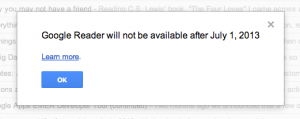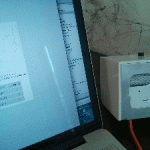This post is a little overdue. I’ll blame my laptop mishap with a concrete floor last week, but that’s a story for another post, this one is about Google Reader, or rather the lack of it. Google have announced that they are powering down Google Reader. If you don’t know what Google Reader is, bear with me – you should do, and I’ll tell you why in a minute. The official line is this:
…usage of Google Reader has declined, and as a company we’re pouring all of our energy into fewer products. We think that kind of focus will make for a better user experience.
That’s about four lots of sad. I’d just started using Google Reader a lot more, in an attempt to get my head back into more long-form content. Don’t get me wrong, I love Twitter, but sometimes it’s good to go deeper.

If you’ve not used it before, Google Reader is an RSS reader. RSS stands for Really Simple Syndication, and it’s the magic glue that sticks the ‘news’ and ‘blogging’ bits of the Internet together, in an open and (usually) free way. It’s got a little bit buried in the new world of Twitter and Facebook updates, but it still does it’s job, and very well. But RSS isn’t a human friendly format – it’s needs a reader. That’s where Google Reader comes in, fetching updates from your chosen blogs and news sites around the web. At least it was where it came in, but from the 1st of July it’s going out, joining an increasingly large dead-pool of former Google products. The ex-Googler behind the product had this to say:
Google Reader was doomed to fail from the very beginning: the company never really believed in it and it took big effort on part of a small team to make it work.
Not all is twinkling lights and fairy dust at the Google palace (a former head of engineering puts it thus), but time and technology marches on. Have no fear, there are a number of alternatives.
Most folks are pointing to Feedly which is a super friendly alternative, and is available for iThingies and Google what’s-its-name tablets, as well as in your desktop browser. If you want to cast your net further afield, Gizmodo has these 8 alternatives, and this is a full spreadsheet of others. Of course, if you are a true geek, you could always build your own, as Internet darling Digg is. There’s a petition to keep Google Reader going too. Yup, good luck with that.
Regardless, the loss of Google Reader is a sad one. It will punch a whole in the remains of the blogging eco system (oops… I nearly said Echo system there – it certainly isn’t that anymore). Google provided a sharing and discovery mechanism for blogs, as well as readership figures. Taking that away tips the balance slightly back from peer-to-peer content to big publisher’s content, and the more chatty worlds of Google+ and Facebook. The tool also had some unusual applications for those subverting government news censorship too.
Here’s the rub for me: Take the time every so often to get away from sound bite social media, as well as big media. Read some things that were written by people like you (or even people unlike you!), encourage some new writers, by commenting on a blog or two.
Blogs remain a mainstay of the bigger Internet. They glue things together, inform the search engines about quality content, through their links, and connect people with people. Install an RSS reader today, and start reading some of your friends’ blogs. Maybe even start blogging yourself. By doing so, you’ll be doing your bit to build the Internet, and keep it in the hands of people, not just the businesses that employ them.






5 comments for “Rescuing the Reader”